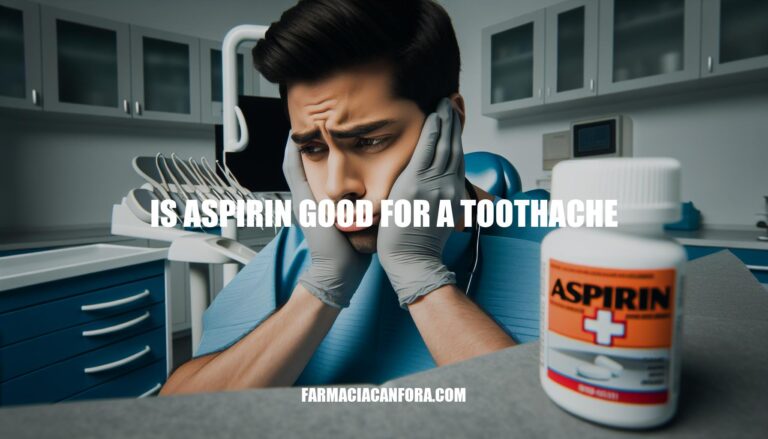


Toothaches are a common issue that many people experience at some point in their lives. The search for effective pain relief methods is a frequent concern, leading to various home remedies and over-the-counter solutions. One popular question that arises is, “is aspirin good for a toothache?” This query highlights the ongoing quest for reliable ways to alleviate dental pain.
Aspirin works by irreversibly inhibiting the enzyme cyclooxygenase (COX), which is crucial for the synthesis of prostaglandins and thromboxanes. Prostaglandins are lipid compounds that play a key role in inflammation and pain. By blocking COX, aspirin reduces the production of prostaglandins, thereby decreasing inflammation and alleviating pain.
Regarding its anti-inflammatory and analgesic properties, aspirin’s ability to inhibit COX enzymes leads to reduced inflammation and pain relief. This makes it effective for conditions involving inflammation and pain, such as arthritis and minor injuries.
When it comes to toothaches, aspirin can help reduce the pain and inflammation associated with dental issues. However, it’s important to note that while aspirin can provide temporary relief, it doesn’t address the underlying cause of the toothache. For persistent or severe tooth pain, it’s best to consult a dentist.
Aspirin is often considered effective for relieving toothache pain due to its anti-inflammatory properties. It works by blocking the production of prostaglandins, which are chemicals in the body that cause pain and inflammation.
Studies and expert opinions suggest that aspirin can help reduce the pain associated with dental issues such as cavities, gum disease, or abscesses. However, it’s important to note that while aspirin can alleviate the pain, it does not treat the underlying cause of the toothache.
Experts also caution against placing aspirin directly on the affected tooth or gum, as this can cause damage to the gum tissue. Instead, it should be taken orally with water. If the pain persists, seeking dental advice is recommended.
Is aspirin good for a toothache? Yes, aspirin can help alleviate toothache pain due to its anti-inflammatory properties. Here are some guidelines on how to properly use aspirin for toothache relief:
Dosage:
Administration:
Precautions:
Remember, while aspirin can provide temporary relief, it does not address the underlying cause of the toothache. Seeking professional dental care is essential for proper treatment.
When considering “is aspirin good for a toothache,” it’s important to be aware of the potential risks and side effects. While aspirin can help alleviate tooth pain due to its anti-inflammatory properties, it can also cause several issues:
It’s always best to consult with a dentist before using aspirin for toothache relief.
Aspirin is effective for toothache relief due to its anti-inflammatory properties. However, it should be swallowed, not placed directly on the tooth, to avoid gum damage.
Clove oil: Natural antiseptic, reduces pain and inflammation.
Saltwater rinse: Disinfects and reduces inflammation.
Cold compress: Reduces pain and swelling.
Garlic: Natural antibacterial, can relieve pain.
Each method has its benefits, but aspirin is particularly effective for reducing inflammation and pain. Always consult a dentist for persistent issues.
The answer is yes, but with caution. Aspirin can help alleviate toothache pain due to its anti-inflammatory properties by reducing prostaglandins production. However, it’s essential to note that aspirin doesn’t address the underlying cause of the toothache and should be used in moderation.
The recommended dosage for adults is 325-650 mg every 4-6 hours as needed, not exceeding 4,000 mg in 24 hours. Children should consult a healthcare provider for proper dosing.
Aspirin can be taken orally with water or dissolved in a small amount of water to form a paste and applied topically, but this method is less recommended due to potential gum irritation.
Precautions include avoiding direct application on the tooth or gums, as it can cause burns or damage. Aspirin may also cause gastrointestinal problems, bleeding disorders, and chemical burns if not used properly.
While aspirin can provide temporary relief, it’s crucial to consult a dentist for persistent or severe tooth pain. Other natural remedies like clove oil, saltwater rinse, cold compress, and garlic can also be effective in relieving toothache pain.